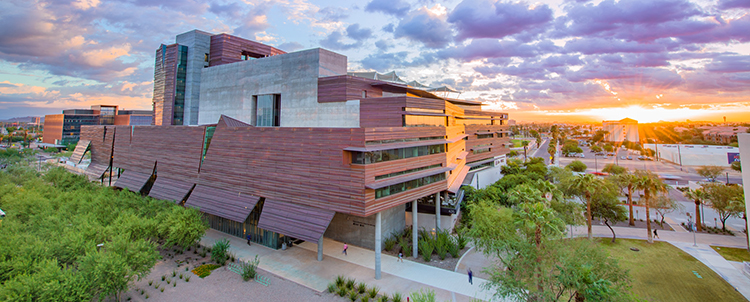
David Krietor appointed as Phoenix Biomedical Campus’ first executive director
David Krietor has been appointed as the new executive director of the Phoenix Biomedical Campus. The City of Phoenix-owned PBC brings together Arizona’s three public universities and other health and bioscience entities in a collaborative space to advance Arizona’s healthcare workforce, biomedical research and innovation ecosystem.
In this new role, Mr. Krietor, former president and chief executive officer of Downtown Phoenix Inc., will spearhead efforts to develop and meet the PBC’s strategic goals and partner with the City of Phoenix to attract commercial enterprises that align with the work of the universities. He also will focus on developing strong collaborative structures and systems to enable the growth and success of the PBC and its stakeholders.
“The Phoenix Biomedical Campus is a vital asset not only to the state, but to the national and global community of bioscience innovation and entrepreneurialism,” said Larry E. Penley, chair of the Arizona Board of Regents, a partner in the PBC Governing Council. “Arizona has one of the fastest growing bioindustries in the U.S. and the PBC is the premier hub for continued advancement in biomedical-related research, academic and clinical facilities. The expansion of the PBC in competitive areas such as precision and digital medicine, for example, can bring increased recognition in research, clinical care and education in Arizona. This is a prime moment to spur the next phase of development of the campus to include a wider range of private sector biomedical and clinical entities as well as bring new commercial activity to the campus. Mr. Krietor is well-positioned to succeed in this new role, given his excellent track record of executive leadership, his long-standing work with the PBC and deep community ties. He will provide exceptional strategic guidance that will help spur the growth of the campus in ways that benefit Arizona and its citizens.”
“The Phoenix Biomedical Campus is a staple in our medical research and bioscience community and is vital to the economic development in the City of Phoenix,” said Mayor Kate Gallego. “Due to the growing demand for biomedical-related research and clinical facilities, the PBC is well-positioned to become one of the leading biomedical hubs in the world. I look forward to Mr. Krietor’s leadership in expanding PBC’s dynamic capabilities, forging new partnerships, and further establishing Phoenix as a top biomedical field destination.”
Established in 2004, PBC development accelerated quickly with the attraction of Translational Genomics Research Institute (TGen) and the International Genomics Consortium (IGC) into the city’s TGen building (2004), university-based research programs in Arizona State University and the University of Arizona’s Arizona Biomedical Collaborative (ABC1) Building (2005), and the opening of the UA College of Medicine - Phoenix (2006). In 2006, ASU moved its College of Nursing and its programs in nutrition and exercise/wellness to downtown Phoenix in facilities on both the ASU Downtown Phoenix campus and in the Mercado at the Phoenix Biomedical Campus.
Since that time, several new university programs in a number of health-related fields have opened. Today, the PBC is a premier environment for research activities, including pharmaceuticals, life and biosciences, medical devices, digital health and data science. It contains among the highest concentrations of research scientists and complementary research professionals in the region, providing firms with unprecedented opportunities for growth and collaborative efforts with industry leaders. In addition to the UArizona College of Medicine – Phoenix, the campus is also home to ASU’s Edson College of Nursing and Health Innovation and College of Health Solutions, and Northern Arizona University’s Physician Assistant Studies, Physical and Occupational Therapy and Athletic Training. The new Wexford Science+Technology “PBC Innovation Center,” a 226,000-square-foot building located at 850 N. Fifth Street, adds private sector into the mix of major users.

“The Phoenix Biomedical Campus is an unsung hero that has contributed to the remarkable changes to Phoenix’s urban core,” Krietor said. “I look forward to advancing the mission of the campus and contributing to the ongoing success of downtown Phoenix and Arizona’s public universities.”
According to a study commissioned by the University of Arizona, the PBC’s economic annual impact is over $1.3 billion and it has either directly or indirectly created over 9,400 Arizona jobs that are concentrated in downtown Phoenix. The PBC already includes approximately 1.7 million square feet of indoor office space and it is expected to grow to 6 million square feet at build out.
“The collaboration between Arizona’s public universities, bioscience and health care industry leaders is fundamental to the growth of Arizona’s economic and workforce development. The campus provides the city with a stable engine of economic prosperity by creating high-paying jobs in a knowledge-based economy,” said ABOR Executive Director John Arnold. “Mr. Krietor’ s expertise will be instrumental in a multi-year effort to expand research presence on the campus. wexHe will partner with city of Phoenix in their intensive efforts to attract small and large private-sector and non-profit biomedical firms to mixed use developments with true urban density and scale.”
Krietor reports to the Arizona Board of Regent Enterprise Executive Committee, which consists of the ABOR executive director and the presidents of ASU, NAU and UArizona.
The PBC Coordinating Council is a planning and governance collaboration which consists of representatives from the City of Phoenix, ABOR, ASU, NAU and UArizona.
Contact: Sarah Harper, Arizona Board of Regents, 602-402-1341, sarah.k.harper@azregents.edu
Eric Jay Toll, City of Phoenix, 602-617-3797, Eric.Toll@Phoenix.gov
Katie Paquet, Arizona State University, 480-727-3938, katie.paquet@asu.edu
Kim Ott, Northern Arizona University, 928-523-1894, kimberly.ott@nau.edu
Steve Moore, University of Arizona, 520-621-9470, stevemoore@arizona.edu
 Back to Listing
Back to Listing